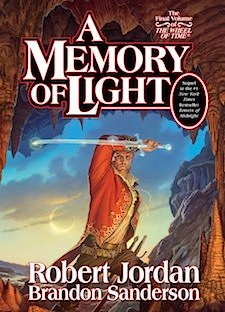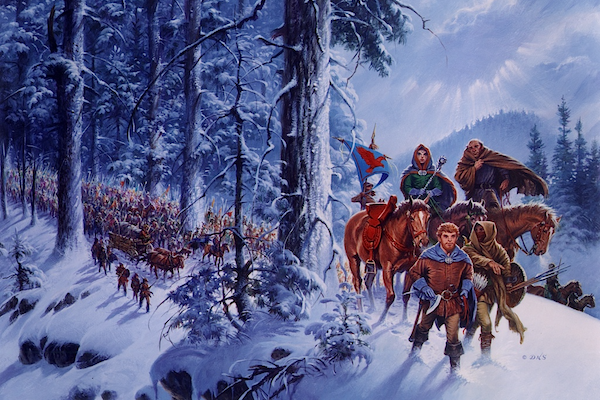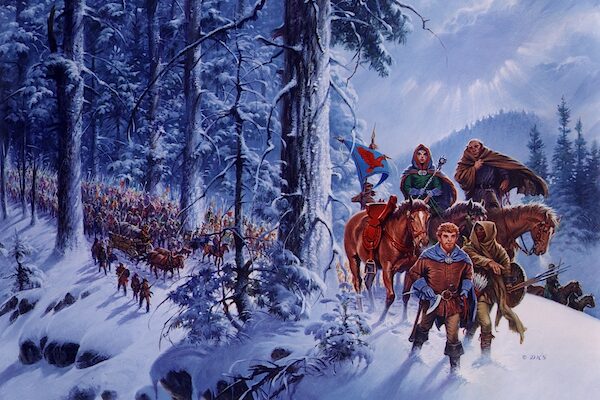If you’re gonna play the game, Wheel of Time Reread, ya gotta learn to play it right!
Today’s entry covers Part 3 of Chapter 37 of A Memory of Light, in which I malign ancient pastimes, and compare Our Messiah to a rather more cyberpunk version of same.
Previous reread entries are here. The Wheel of Time Master Index is here, which has links to news, reviews, interviews, and all manner of information about the Wheel of Time in general. The index for all things specifically related to the final novel in the series, A Memory of Light, is here.
Also, for maximum coolness, the Wheel of Time reread is also now available as an ebook series, from your preferred ebook retailer!
This reread post, and all posts henceforth, contain spoilers for the entire Wheel of Time series. If you haven’t read, continue at your own risk.
And now, the post!
 Chapter 37: The Last Battle [Part 3]
Chapter 37: The Last Battle [Part 3]
What Happens
Mat orders Galad Damodred (via gateway) to hold his position, uninterested in the other man’s opinion on the matter, and Galad acquiesces coldly. After the gateway closes, Elayne makes it clear she is not thrilled with Mat’s treatment of Galad either, and Min tells them she saw Galad’s body “alone, on a field, as if dead.” Tuon and Elayne both think the Shadow’s general, whom Mat is convinced is Demandred, is outmatching Mat. Mat answers that it is not that simple.
He had to be capable enough to keep Demandred back, but weak enough to invite aggression. A feint, ever so subtle. It was dangerous, possibly disastrous. He had to walk on a razor edge. There was no way to avoid cutting his feet. The question was not whether he would be bloodied, but whether he would reach the other side or not.
Mat sends orders to Lan’s company and the Ogier while observing the enemy’s movements via window gateway, and sends a coded message to Talmanes referring to a drunken bet they’d made a while back. He watches the Sharans move to intercept Lan’s troops before they’d even made the change he’d ordered, which confirms Mat’s suspicions that the Shadow had a spy, a channeler, inside the command tent itself. The messenger sent to Talmanes returns to report that his forces are “completely ruined,” and that the dragons will take weeks to repair, and that they are “worse off than a barmaid in Sabinel.”
Sabinel was a town where Mat had tried to make Talmanes help him win over a pair of barmaids. Talmanes had suggested that Mat feign a war wound to get sympathy.
Good man. The dragons could still fight, but they probably looked busted up something good.
He knew he would have to wait until the perfect moment to use them, though, and sends more orders to Aludra. Elayne demands that he give her at least some idea of what he’s doing. Mat considers the number of people in and out of the tent, any of whom could be the spy, and casually suggests that Elayne (and Birgitte) take a walk with him. Elayne catches on, though, and weaves a ward against eavesdropping as they leave the tent. Mat tells her he wants to use the spy, not roust him out, but he wants her away from the command tent. He explains to her his theory that war is like playing cards: you can lose ninety-nine out of a hundred hands as long as you win the crucial one.
“And that’s what you’re doing?” Elayne asked. “You’re faking that we’re losing?”
“Bloody ashes, no,” Mat said. “I can’t fake that. He’d see through it. I am losing, but I’m also watching. Holding back for that last bet, the one that could win it all.”
“So when do we move?”
“When the right cards come along,” Mat said.
He wants to send the Andorans to the ford, to help hold the river once Demandred succeeds in damning the water flow. Elayne agrees, and declares she will go with them, to Birgitte’s consternation. Elayne points out that this will get her away from the command tent, and promises to let Birgitte surround her with as many guards as she wants. Birgitte sighs, and they leave. Mat thinks that now is the real challenge: getting Tuon to do what he wants.
![]()
Galad leads the Children in a sweeping cavalry charge against the Trollocs struggling across the river near the ruins, supported by Tam’s archers. As troops have died, their remnants have been merged with other groups, so Galad’s company now includes all sorts, including two Warders (Kline and Alix) who have lost their Aes Sedai and are fighting with suicidal ferocity. Galad returns to the ruins and reflects that perhaps he had misjudged Cauthon’s wisdom in keeping them here. He discusses their situation with Golever, and admits he cannot make sense of Cauthon’s overall plan. Then he notices that the river is drying up, and realizes Cauthon knew it would happen, which is why he sent so many troops to the river.
Light, Galad thought, I’m watching the Game of Houses on the battlefield itself. Yes, he had not given Cauthon nearly enough credit.
A raken drops a coded message for him, which orders him to move to Hawal Ford and look for Elayne’s banner, and await further instruction, along with a sly reference to avoiding men with quarterstaffs, as Cauthon “knows he has trouble with those types.” Galad sighs, but is pleased to be able to keep watch on his sister, and hopes that this may give him a better picture of the battle.
![]()
The Dark One attacks, trying to destroy Rand’s soul, and Rand barely withstands the onslaught. Rand tells him that he will not break, but the Dark One replies that this is just preparation.
“For what?”
TO SHOW YOU TRUTH.
Rand finds himself in a barren, sickly land, before a dreary, dark city. He asks what this is, and is told IT IS WHAT WILL BE. Rand reaches for the One Power but finds that the taint is back on it, a hundred times worse than it had been before. He walks toward the city, and encounters some men outside it, chopping at trees. He recognizes one of them as his father, but much older. He tries to speak to Tam, but Tam only stares dully. Two of the others are Dannil and Jori; Dannil is covered in sores, and Jori strikes an insect’s nest which swarms over him, killing him in moments. Tam runs, and is caught by a vine which wraps around his neck. Rand screams and seizes saidin despite the taint, burning the vine away, but Tam is already dead. Dannil grabs his arm and tows him toward the city, not recognizing him.
THEY DO NOT KNOW YOU, ADVERSARY. I HAVE REMADE THEM ALL. ALL THINGS ARE MINE. THEY WILL NOT KNOW EVEN THAT THEY LOST. THEY WILL KNOW NOTHING BUT ME.
“I deny you,” Rand whispered. “I deny you.”
DENYING THE SUN DOES NOT MAKE IT SET. DENYING ME DOES NOT PREVENT MY VICTORY.
Dannil tells him they were sent to cut wood as punishment for displeasing their master. Rand realizes as they approach the city that it is actually Emond’s Field. He tells himself that it isn’t real, but thinks that this is what will happen if he fails. At the gates, Dannil turns him over to the Fades guarding it; Rand tries to run, but Nynaeve emerges and shields him. She rewards Dannil with his life, and drags Rand through the streets of the town, where people cringe before her and call her “Chosen.” She brings him to where thirteen channelers (Damer Flinn is one) and thirteen Myrddraal wait.
What if they Turned him? This wasn’t real, but it was a version of reality. A mirror world, created by the Dark One. What would it do to Rand if they Turned him here? Had he been trapped that easily?
Rand tells Nynaeve that he comes from a place where the Dark Lord doesn’t rule, but Nynaeve laughs at the idea. Rand can sense that this nightmare world is a real possibility, one where the Dark One had won, broken the Wheel, and reshaped the Pattern to suit himself. He screams as they begin to Turn him, and demands to know if this is the worst the Dark One can bring against him.
THE FIGHT IS OVER.
“IT HAS NOT YET BEGUN!” Rand screamed.
The reality around him shattered again into ribbons of light. Nynaeve’s face shredded, coming apart like lace with a loose thread. The ground disintegrated, and the fortress ceased to exist.
Rand tells the Dark One that he will not be captive to his nightmares, and that he, Rand, is greater than he once was. He seizes the threads that wove that nightmare world and begins to spin them into a different possibility.
“Now,” Rand said, breathing deeply, trying to banish the horror of what he had seen. “Now I will show you what is going to happen.”
Commentary
I have some (very amateur) experience with playing poker, enough to know that the old adage is true: if you want to win, you don’t play your cards, you play your opponent. True, the actual cards themselves cannot be discounted, because (for example) four aces in the possession of even the worst bluffer is still an unavoidably winning hand, but how much you win with that hand still circles back into how and how much you can bet—and how much you can fool your opponent into betting in turn. It is learning to manipulate that balance between luck and strategy that separates serious poker players from folks screwing around for funzies. (This is also why I will never be a serious poker player, because as a general rule I can’t lie for shit, but that’s neither here nor there.)
War, in the sense that it can be compared to a game, is much more often compared to chess than it is to poker, but I sort of disagree with that, because I always think of something my mother once remarked about chess. She doesn’t like chess, she said, because it is one of the only games she’s ever played that has absolutely no element of luck to it. There are no dice to roll in chess, no cards to be randomly dealt; in chess, there is no opportunity for chance to change the course of events. In chess, then, there is only strategy; luck doesn’t come into it. And to her, I think, this makes chess oddly pointless, in a way. Which I’m sure is a sentiment that would have chess aficionados everywhere foaming at the mouth, but I do rather see her point.
Because really, there is nothing in life that is free of the effects of random chance. There is nothing, in my experience, that can be completely controlled by dry planning and careful strategy, because there is always that random, left-field thing no one saw coming that sweeps in when you least expect it, and either fucks it all up royally, or sweeps it to utterly unanticipated levels of awesomeness. And if you don’t account for the possibility of random chance, you are not an effective planner and/or strategizer for anything.
And I don’t think there is any life circumstance of which that is more true than war.
Which is why I so appreciate Mat’s analogy here comparing the “game” he is playing with Demandred to playing poker (well, he says “cards,” but we know he means the Randland equivalent of poker). It’s true that he’s saying to Elayne that there is much less of an element of chance to it than dice, rather than comparing it to something that has no element of chance at all, but I think the point I am making about chess vs. poker also stands. Especially when it comes to Mat, from whom the concept of luck literally cannot be made separate.
Galad likens Mat’s maneuvers to playing the Game of Houses, and there is definitely some similarity there, but Daes Dae’mar is, in my opinion, much more chess-like than the game Mat is playing. There is no doubt that strategy is a huge part of what Mat’s doing, but as he says to Elayne, he’s also relying on his luck. He’s waiting and watching for chance to deal him that perfect hand so that he can take advantage of it at the most opportune time possible, while acknowledging that there is a chance, heh, that he won’t ever get dealt that hand at all.
And that ain’t chess, honey.
The awesome thing about Mat is that the circumstances of his making over the course of the series into as near an ideal of a military commander as possible acknowledges that both elements are needed, and that they are pretty much the same things that are needed to be a superior gambler. Mat’s memories gave him the strategy, and his ta’veren-ness (plus Shadar Logoth dagger taint, maybe) gave him the luck, and those two things combined is what made him the only possible person to run this campaign and have a shot at winning it. It’s All Very Symmetrical, which is why I love it.
Anyway.
On the spy: I have no idea who it turns out to be. I find, in fact, that 90% of my memory of this chapter from my first readthrough is very hazy indeed. I suspect that is due more to brain fatigue than anything else. I appreciate the symbolic logic of making this chapter one giant massive unending slog of battle, because that’s exactly what it is about, but it turns out that chapter breaks are a lot more psychologically important than I realized, in terms of allowing your brain to divide the story into actual digestible and retainable chunks of information. So, I applaud the idea, but also acknowledge the idea’s drawbacks, which is that a lot of this is coming across to me as if I’d never read it before. It’s a little disconcerting. Oh well.
Min’s vision of Galad here had me pretty well convinced (as I recall) that he was going to bite it at some point, so that was a nice misdirect, there. Well-played.
As for Rand’s portion of the show, well. It’s all very Matrix-y, isn’t it? This isn’t a criticism, really, because (a) I loved The Matrix (as long as we pretend the second two movies never existed) and (b) the reason The Matrix was such a great film is because it tapped into a veritable plethora of archetypal images and themes, and neither it nor WOT are the first (or last) to use those themes to great effect.
Most notably here, the concept that perception and reality are both separate and inextricably linked. Not to mention the idea that perception can mold reality just as easily as the other way around. And really, when you think about it, that’s the only reasonable way to portray Rand’s situation, even more so than Neo’s. The idea that Rand’s mind creates its own, more mundane platform for rendering circumstances that would otherwise be too vast and incomprehensible for the human mind to encompass is the only real way to not make his entire interaction with the ultimate anthropomorphization of Evil ridiculous. It may not be original, but it’s about the only way it could have been done, so there you go.
Also very Matrix-y is Rand’s related thoughts about whether Turning him in this possible nightmare world would really work on him in real life, as long as he perceived it to be real. And lastly, of course, is Rand figuring out how to manipulate the threads of the Matrix this pseudo-Pattern himself.
Which was a lot less ominous when I didn’t know what was coming next in that storyline. Eeek.
But that’ll be for later on, dearies! Have a week, and I’ll see you next Tuesday!












